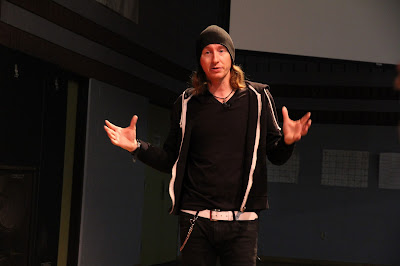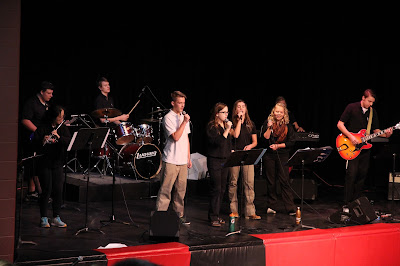Mayhem ensued.
“The innocent little
boys turned into the most vicious, terrible things I have seen in my life,”
Gordon said. They were hitting and shoving each other, and soon turned to using
sticks and stones to inflict maximum harm.
“And you know what I
did?” Gordon asked.
“Nothing.
“I just stood there
and watched. I knew I should have done something, but I just stood there.”
Gordon said that’s how
many of us react when we sense a need to step up.
Gordon had the
students read Matthew 5:14-16.
"You are the light of
the world. A town built on a hill cannot be hidden. Neither do people light a
lamp and put it under a bowl. Instead they put it on its stand, and it gives light
to everyone in the house. In the same
way, let your light shine before others, that they may see your good deeds and
glorify your Father in heaven.”
There are three ways
to think about “the world,” Gordon said. It can be physical geography, the
place where you are. The world is also systems and kingdoms, such as business,
government, entertainment or science. And finally, the world is also the inner
circles in which we find ourselves – the family members, friends, sports teammates
or co-workers.
If we are commanded by
Jesus to be a city on a hill, to be a light to the world, it could be in any
one of those ways, he said.
Gordon asked students
to bow their heads and spend 30 minutes in silence with God, thinking about “one
person in your life you have a relationship with, who needs someone to step in
and be a light.”
It might seem daunting
to consider it, “but if not you, then who?”
Jesus commanded us to
be light to the world, “not just to open doors and hand soup to people,” he
said.
“When Jesus calls us
to follow him, he wants us to reflect him. To be a light, you must reflect Jesus.
And if he is not king of your life, how can we establish his kingdom in this
world?”
Gordon said there are
several reasons why he stays on the sidelines. Sometimes, he forgets his
calling, and slips into thinking that “believing in God does it, I’ve got my
ticket to heaven.”
Sometimes he doesn’t step
up because he’s afraid of persecution – which in Canada is seldom life-threatening,
he admitted.
“So what am I really
afraid of? What is really keeping me on the sidelines, so God is not glorified
in my life? It’s a friend saying something negative about me. It’s a friend making
an assumption about me.”
When another Sunday
school teacher saw the chaos outside with Gordon and the little boys, she came
running out, yelling. To Gordon’s surprise, she was mad at him.
When he protested and
said he didn’t know what to do, she said, “Just do something.”
Gordon said that’s the
secret. “When you take the first step, God can use it. You have no idea how God
can use that little step and perhaps change eternity for someone. And if not
you, then who?
“Someone in your life
got off the sidelines and was a light for you. I hope the domino effect doesn’t
stop with me, or stop with you.”
Student praise team,
Elucidate, led worship with “Desert Song,” “Holy Spirit,” “Heroes,” “One Way,”
and “I am Free.”
Here is the message in Mandarin, with many thanks to Yanyan Wu.
同学们,以下是今天的信息简要。
讲员用他教幼儿主日学的经历。他第一次带大约十个小明友到院子玩,孩子们开始打起来,有扔石头的,有拿树枝的,也有练空手道的,我居然傻傻的站在边上观望。作为基督徒,我们何尝不是这样?
我们看到世界,国家,城市,学校,家庭一团糟我们常常站在边上观望,等待。
马太福音 5:14-16
你们是世上的光。城造在山上是不能隐藏的。 人点灯,不放在斗底下,是放在灯台上,就照亮一家的人。 你们的光也当这样照在人前,叫他们看见你们的好行为,便将荣耀归给你们在天上的父。」
圣经这里告诉我们,我们是世上的光。世上的意思是这个世界,我们所处的环境,我们的家庭,我们的学校都属世上的范围,那么我们是否有光呢?耶稣说祂就是光,只有接受耶稣基督才会有光。你接受耶稣基督了吗?当你有光吋时,你有照亮你的周围吗?还是根本就看不到你的光?
作为一个基督徒,你不照亮这个世界,谁可以?可能你会有很多的借囗,你害怕别人笑你,你害怕与别人不一样,你害怕……同样,主耶稣在这里命令我们,我们的光要照在人前,就是叫人看见我们的好行为,别人就知道我们是主的门徒。
回到讲员的经历,当他在一旁傻傻的看着孩子们打架时,主日学负责人冲出来吼叫说"Mike,你在干什么?" 他沮丧的说:"我不知道该怎么做。"
她说:" 你总要做些事,哪怕一点也好。" 是的,作为基督徒,你可能改变不了大局面,但当你愿意做一点做一点再做一点就改变了整个世界。










































